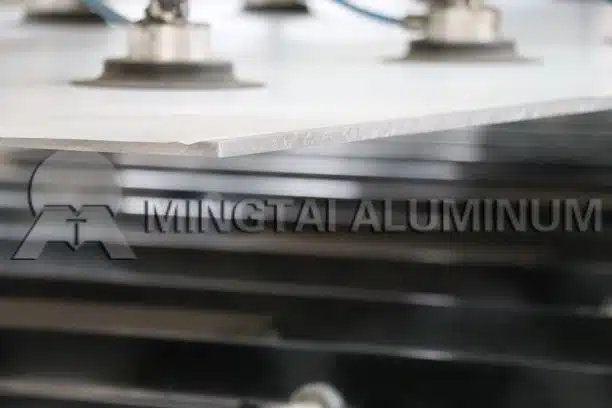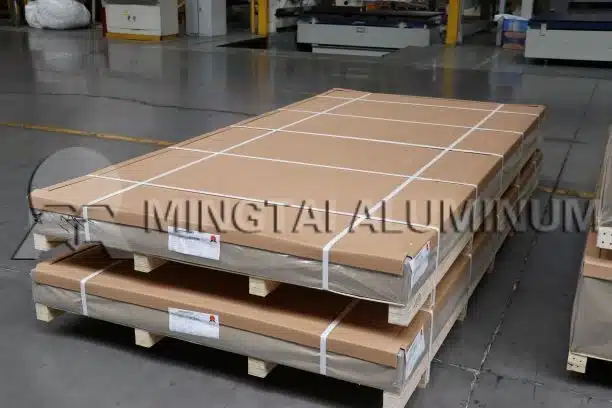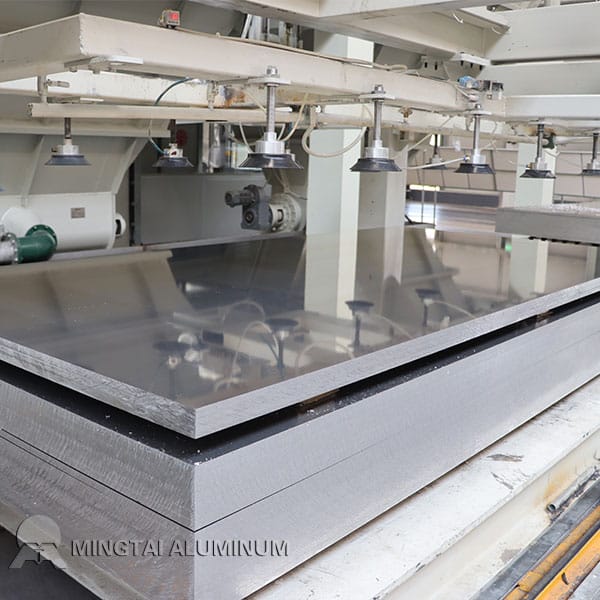Aluminum panels are a top pick for trailer builders and DIY folks. They’re light, tough, and don’t rust easily. But choosing the right ones takes some thought. You need to look at the alloy, thickness, finish, and other stuff to make sure they work well for your trailer. This guide breaks it all down to help you find the perfect panels for your project.

Choosing the Right Aluminum Alloys for Trailers
Common Alloys Used in Trailers
Not all aluminum alloys are the same for trailers. The most popular ones are 3003, 5052, and 6061. Each has its own strengths depending on what you need.
3003 Alloy Features and Uses
3003 aluminum sheet has a smooth, semi-shiny finish and is popular for many applications, including: fuel tanks, food & chemical handling, trailer siding & roofing, etc. It welds and shapes super easily. It also fights rust well. This makes it great for non-heavy parts like trailer walls or roofs where flexibility and rust resistance matter more than strength.
5052 Alloy Strength and Rust Resistance
5052 aluminum is stronger than 3003 and still great at resisting rust. At present, MINGTAI ALUMINUM 5083 aluminum plate, 5086 aluminum plate, 5052 aluminum plate and other products have successfully entered the world shipbuilding market, which attests to its high performance in harsh environments. It’s a solid choice for trailers in salty coastal areas or on winter roads.
6061 Alloy for Structural Parts
6061 aluminum sheet has good corrosion resistance, high toughness, no deformation after processing, easy coloring, good oxidation effect and so on. It’s a do-it-all alloy with awesome strength. It’s perfect for heavy-duty trailer parts like frames or ramps where toughness and easy machining are key.
Things to Think About When Picking an Alloy
Load Needs and Strength
What your trailer does decides which alloy you need. Light utility trailers carrying small gear can use a softer alloy like 3003 for covering. Heavy cargo trailers need stronger alloys like 5052 or 6061. These handle bigger loads without bending.
Weather and Rust Risks
If your trailer’s out in wet or salty conditions, rust is a concern. Alloys like 5052 or marine-grade 5083 are better for that. Marine grade 5083 aluminum alloy is one of the most widely used aluminum plates in ship manufacturing. They stay strong with less upkeep.
Choosing the Right Aluminum Sheet Thickness
Standard Thickness Options
Aluminum sheets come in all sorts of thicknesses. They range from super thin (around 0.025 inches) to thick plates over half an inch. Common ones for trailers are:
Light panels: 0.025"–0.063"
Medium-duty parts: 0.080"–0.125"
Heavy-duty pieces: ≥0.190"
Matching Thickness to Your Trailer’s Job
Light vs. Heavy Trailers
For light utility trailers hauling small stuff, thin sheets like 3003 alloy work fine. They keep things light without extra weight.
Heavy cargo trailers carrying big machines need thicker panels. Stronger alloys like 6061 or 5083 do the job here.
Balancing Weight, Strength, and Toughness
Picking the right thickness means finding a sweet spot. Thicker sheets are tougher but heavier. That can hurt fuel efficiency or towing power. Strong alloys let you use thinner sheets without losing strength.
Choosing the Right Type of Aluminum Sheets
Smooth, Tread, or Corrugated Panels
Each type of sheet has its own use based on how it’s made:
Tread Plate for Non-Slip Floors and Ramps
Tread plates have raised patterns for extra grip. They’re awesome for floors or ramps where you don’t want to slip.
Smooth Sheets for Walls and Roofs
Smooth sheets look clean and neat. They’re great for side walls or roofs. They’re also easy to paint or stick decals on.
Corrugated Panels for Strength and Style
Corrugated sheets are wavy and super sturdy. They’re good for walls where you want both toughness and a cool look.
Coated vs. Uncoated Sheets
Coated sheets have protective layers. These fight off weather and need less care over time. They also keep colors looking good in the sun.
Uncoated sheets cost less up front. But they might need extra treatments or more cleaning depending on the weather.
Choosing the Right Aluminum Sheet Size
Standard Sizes Out There
Common sizes include:
Widths: Up to about 2 meters (e.g., the common length and width are 2000 * 6000mm)
Lengths: Usually up to around 8 meters
These sizes fit most trailer builds with little waste when cutting.
Custom Sizing for Your Trailer
Off-the-shelf sizes are great for many projects. But custom-cut panels fit perfectly. They save time during setup and make your build look sharper. MINGTAI ALUMINUM produces and supplies aluminum plates which can be customized according to customer requirements.
Choosing Colors and Finishes for Aluminum Sheets
Color Choices and What They Mean
Color isn’t just about looks. It affects how the trailer works:
Reflective Colors for Heat Control
Light colors bounce off sunlight. This keeps the trailer cooler in hot weather.
Darker Colors for Style
Dark finishes look sleek and modern. But they can soak up heat unless you add insulation inside.
Types of Finishes: Matte, Glossy, Brushed, or Anodized
Finishes change both looks and performance:
Durability and Care for Finishes
Anodized finishes resist scratches best. Brushed ones hide small marks better than glossy finishes. They have excellent processing performance, good corrosion resistance, easy polishing, easy coloring film, and good oxidation effect. These make coated or anodized finishes awesome for trailers in sunny or tough conditions.

Picking aluminum panels for your trailer means thinking about what it’ll do and where it’ll go. Choose alloys like flexible 3003 or tough 5083 based on your needs. Pick the right thickness, type, size, and finish to keep it strong, light, and good-looking. For top-quality panels made for trailers, MINGTAI ALUMINUM produces and supplies aluminum plates. Welcome to consult and purchase! Go with MINGTAI ALUMINUM’s high-grade aluminum panels for your next trailer build!
FAQ
Q: How can I tell if aluminum panels beat steel for my trailer?
A: Aluminum weighs less than steel. That can help save on fuel and makes your trailer easier to tow. Aluminum also fights off rust much better. This is super useful if you're near the ocean or often deal with wet weather. Steel could be cheaper up front, but it's heavier. It usually requires more maintenance over time. Go for aluminum if keeping weight down and easy upkeep are important to you.
Q: Are aluminum panels good for custom trailer designs?
A: Yes, absolutely. Companies like MINGTAI ALUMINUM can make panels cut to match your exact trailer's shape or size. Send them your design details. This makes sure the panels fit your plan perfectly. Custom orders might cost a little extra. But they save you time when putting it together.




